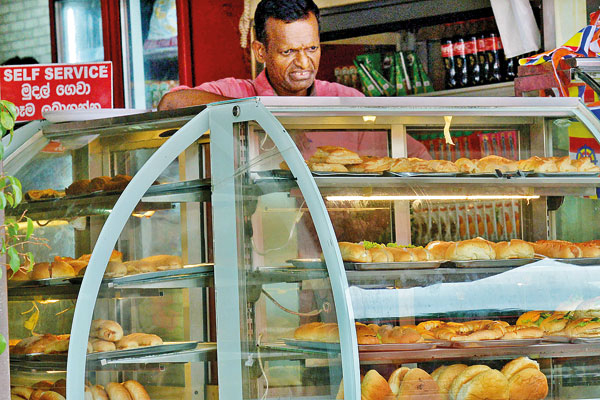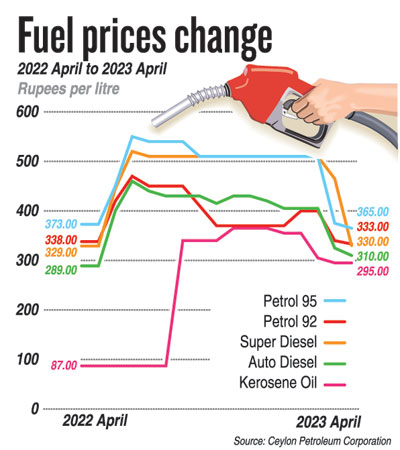News
Stubborn retailing habits prompt debate on stronger regulator
View(s):By Senuka Jayakody
This has now led to a debate on whether a new regulator is needed.
From May 1, the price of 92 octane petrol was reduced by Rs.7, and 95 octane petrol by Rs.10. Diesel was cut by Rs.15 and super diesel by Rs.135. This was the second price reduction in almost a month. Litro Gas cut the price of a 12.5kg cooking gas cylinder by Rs.100, although Laugfs Gas did not, citing higher global prices.

There are concerns about bakeries that set prices based on production costs. Pic by Eshan Fernando
Rumy Marzook, a former chairman of the Consumer Affairs Authority said: “People should wait, and have patience”. Prices do not fall overnight, he said.
He said regulation is needed.
Ranjith Vithanage, president of the National Movement for Consumer Rights Protection, suggests establishing an independent regulator. “We sent a letter last week requesting the minister to set up an independent regulatory authority to calculate prices and declare prices accordingly.’’ It should have legal powers to act based on independent research.
Prices don’t drop as much as they rise, he said.
Mr. Vithanage also criticised the CAA for its inefficiency. “The CAA has problems with resources and some officials have taken bribes from businessmen.’’
However, Consumer Affairs Authority (CAA) Chairman Shantha Niriella, believes that prices of goods have been dropping in proportion to the price reduction in services.
“We placed a gazetted price on rice, when it was increasing rapidly, and now consumers can buy rice at fair prices,’’ he said. It is now rare to hear of a trader who had sold rice above the gazetted prices.
Mr. Niriella expressed concerns about bakeries that set prices based on production costs. “Consumers should receive bakery items at a fair price,’’ he said.
As for vegetables, the CAA does not plan to regulate prices. “Natural causes” and “market behaviour”, determine prices. So, a gazetted price “cannot be imposed”.
Duminda Priyadarshana, a senior research officer of the Hector Kobbekaduwa Agrarian Research and Training Institute, also suggested setting up a regulatory authority for food and non-food items.
“In rural areas, income is spent equally on food and non-food items. But in urban areas, 65% is spent on non-food items,’’ he said, adding that the prices of non-food items have not dropped.

The chairman of the All Island Restaurant Association, Asela Sampath said eateries can cut prices. “But there is no system to reduce prices.’’
The price of a 650g fried rice fluctuates between Rs. 500 and Rs. 600. Ingredients cost Rs. 265.
“We urgently need a regulatory mechanism so that consumers can at least enjoy fried rice at a proper price,’’ he said.
He asked why price limits can’t be set for cooked food.
Prabath Susantha, deputy chairman of the Manning Market, expects prices of goods to increase as usual in May. “Due to the rains, farmers tend to cultivate less. There is also rain damage.’’
Further, lower prices have prompted farmers to cultivate less.
“Last month, green beans were at Rs. 80 or Rs. 100. On Wednesday, it was Rs. 400,’’ he said. Fruit is equally expensive.
All Ceylon Bakery Owners Association President N. K. Jayawardena said the price of pastries will not be reduced. “The tax on flour has increased by Rs. 13 recently. Sugar has increased from Rs. 150 to Rs. 250.’’
He said only 100 of 5,000 bakeries had received imported eggs and domestic prices remain high.
Shantha Ekanayake, a businessman at the Dambulla Economic Centre, said higher wages and maintenance costs of vehicles mean that prices of vegetables will not drop despite lower fuel prices. “It costs Rs. 60,000 to Rs. 70,000 to service a vehicle. It has to be done every 6,000 km.’’
He reckons the price of vegetables has fallen in Dambulla because farmers grew more when prices were high a few months ago. He expects a price rise in the next few months, but not by much.
As for three-wheeler fares, All Island Three Wheeler Drivers Union secretary T. R. Pallie refuses reductions. Earlier, fares were reduced by Rs 10.
He argued for a higher fuel quota. “Eight litres is not even enough to drive for two days.’’
He considers the fuel price reduction as a Government ploy to please people. “Instead, increasing the fuel quota would have benefitted the Government as well.’’
All Ceylon Children’s Transport Association President Lalith Chandrasiri Fernando said some driver can pass on the fuel price cut to parents, adding the group “would not be involved in transactions between drivers and parents.’’
But, he said, many of them can’t because while diesel is lower by Rs. 15, the cost of a tyre has increased from
Rs. 23,000 to Rs. 94,000. It costs to Rs 500 to fix a puncture, he said.
| Economic ill health feeds into prices Sri Lanka’s economy is reeling from an unprecedented downturn and bank borrowing rates remain high. Utility costs are at astronomical levels and further increases have been flagged mid-year. Prices have slowly edged lower, but food prices have not budged in April. The Standing Lending Facility rate is at 16.50%. There is also a massive adverse impact on homes and industries from higher electricity and water tariffs. Reflecting the economic contraction, electricity sales to industry in January fell by 18.7%. Despite lower prices, diesel sales are down by 43.7% from January to March, petrol sales fell by 25.8%, and kerosene sales dived by 71.2%. In 2022, the agriculture sector fell by 4.6%. Paddy production alone in Yala and Maha seasons were down by more than 30% year-on-year, Central Bank of Sri Lanka data show. The industries sector output dropped by 16%, and services shrank by 2%. So far this year, prices of select goods and services were reduced. But food prices barely budged in April. Among commodities, dhal was recorded at Rs 343 a kilo in March at the Pettah Market versus Rs 375 in the same month of 2022. But, samba rice is Rs 221.14 compared with Rs 181 a year ago in March 2022. Late March, the minimum public bus fare was cut to Rs 30 from Rs 34. But, Gemunu Wijerathne of the Lanka Private Bus Owners’ Association is on record saying fares will not be cut. | |
The best way to say that you found the home of your dreams is by finding it on Hitad.lk. We have listings for apartments for sale or rent in Sri Lanka, no matter what locale you're looking for! Whether you live in Colombo, Galle, Kandy, Matara, Jaffna and more - we've got them all!

